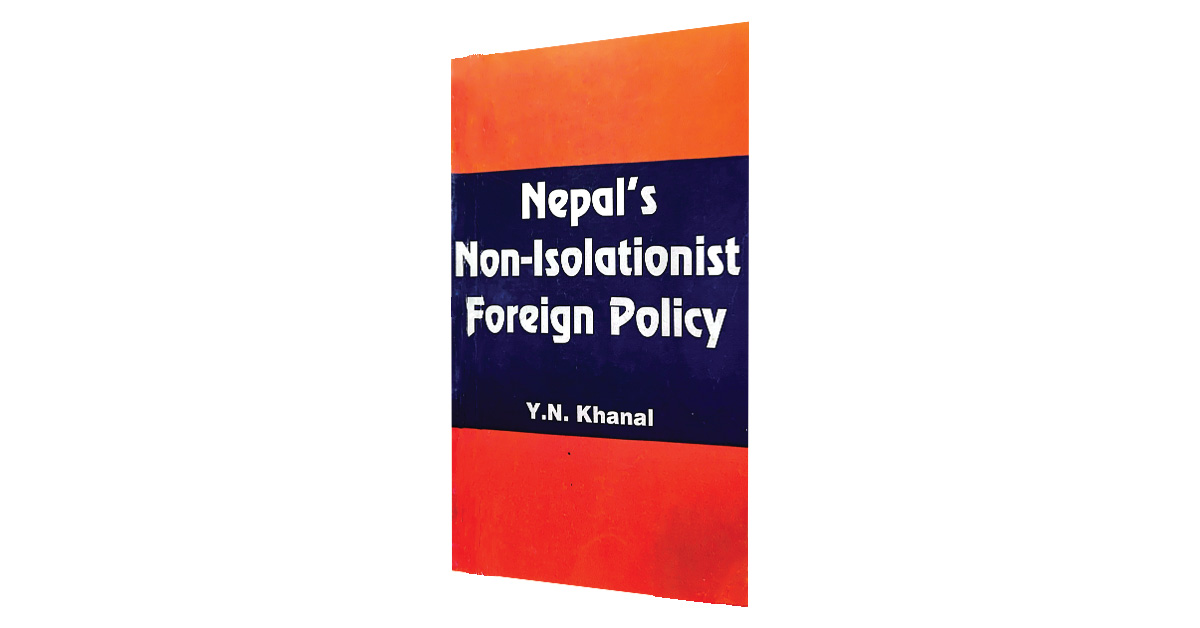
In a renowned book named ‘Yadu Nath Khanal: Jivani Ra Vichar’ (Biography and Thoughts), author, former Ambassador Jayaraj Acharyal, has written, “Prithvi Narayan Shah unified Nepal, Bhanubhakta Acharya standardised Nepali language and Yadu Nath Khanal intellectualized Nepal’s foreign policy.
Yadunath can understand both Kautilya and Kissinger in diplomacy and apply it in their own practice.” This remark by the distinguished diplomat reflects the capabilities of the former foreign secretary, a pioneer diplomat and scholar, Professor Yadu Nath Khanal.
Khanal, in his book titled ‘Nepal’s Non-Isolationist Foreign Policy,’ has shared his interactions, meetings, ideas, reflections, thoughts, and suggestions in a series of essays, offering valuable insights into Nepal’s foreign policy.
The collection of his writings was published by Satya Publications in 2000. According to Khanal, this book is a combined volume of his five earlier publications, originally released at different intervals between 1964 and 1977. The essays in the book compile Khanal’s observations on Nepal viewed in a wide sense as a member of the international community.
Before reviewing his book, let us first learn a little more about Professor Khanal’s journey. After a 104 year long authoritarian Rana regime (1846-1951), the Himalayan nation ambraced democracy in 1951. During this era of democracy, Nepal was rapidly establishing bilateral relations on the global stage. Following these developments, Nepal also became a member of the United Nations in 1955 and later joined the non-alignment movement.
The world was divided into two major polar blocs during the cold war – one led by the Soviet Union, and the other by the United States. In such a complex geopolitical frame, Khanal, a key diplomatic official, played a crucial role in shaping Nepal’s international relations. He was the one to emphasize the need for Nepal to adopt a policy of non-alignment.
Khanal served as Nepal’s foreign Secretary, ambassador to India and China, and as a consultant to several nepali Prime Ministers at different times and under various political systems. He was appointed foreign secretary and later ambassador to India under King Mahendra Shah. Later, King Birendra Shah nominated him as ambassador to the United States and China.
After the establishment of multi-party democracy in 1991, Khanal was appointed as the foreign affairs adviser to the then Prime Minister Krishna Prasad Bhattarai during the interim government, and later to Prime Minister Girija Prasad Koirala. Born in August 1913 in Tanahun, Khanal passed away in October 2004.
The first section of his book, a compilation of 11 collected essays, reflects on Nepal-India relations. These essays are focused on Nepal’s foreign policy, strategies to improve Nepal-India relations, role of the United Nations for smaller nations, and the Nepali diaspora.
Likewise, the second part- stray thoughts- consists of 14 different essays including World Peace and Jawaharlal Nehru, Nepal’s Panchayat system, the United Nations systems, Nepal’s role in the Afro-Asian movement, the role of women in Nepal, and the role of Sanskrit in those times, among other diverse issues.
In the third segment, he has compiled 33 essays focusing on Nepal’s transition from isolationism. Here, has also essayed his experiences as ambassador to five different missions in this part of the book. This segment too hosts a variety of issues ranging from Laxmi Prasad Devkota, and our traditions, to the United States and Asia, a small Asian country’s view, the world as seen from Kathmandu, the three planes of perception.
Focused on Nepal’s foreign affairs, the fourth is a collection of 26 essays discussing foreign policy outline and the recent trends in foreign policy. It also reflects on the status of non-alignment, diplomacy and international law to South Asian regional cooperation, nationalism, SAARC, regional security, China’s modernizing foreign policy, and Asia’s common values and heritage.
The concluding part of the book is a compilation of 15 essays on on Nepal after the restoration of democracy. Prof. Khanal, in this section, discusses Nepal, liberal democracy and Fukuyama, the challenges of democratic governance in South Asian countries, politics and administration in Nepal, the continuity and change in Nepal’s foreign policy, the relevance of non-alignment, an overview of Nepal’s current state, and eluding political stability in Nepal in 1977.
Khanal in his introduction, wrote, “Foreign policy has a significant element of continuity determined by history, geography, and economy.” This shows his potential for diplomacy. As an ambassador, he was clear about his job as well. Taking reference to the Sanskrit language, he said, “An ambassador has three masters, the national government, the host government and their people.” This shows his clear vision in diplomacy.
We can say that the book, Nepal’s Non-Isolationist Foreign Policy, is a comprehensive detailing of Nepal’s foreign affairs document that also reflects Nepal’s political history, along with other insightful information. The book will be worth reading for both Nepali and foreign readers interested in Foreign Affairs and International Relations.
To conclude the detailing of this book, I would like to quote former Ambassador Acharya once again, “Prof. Khanal has made outstanding contributions in explaining Nepal’s foreign policy to the international community in modern terminology.”